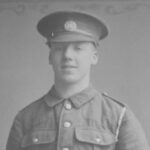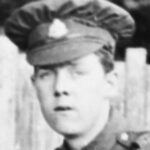Andrew was one of four Bergholt men to join the Northamptonshire Regiment together, in August 1914. Three of the four men were all killed on the same day – the heaviest loss that East Bergholt would suffer on a single day, during the Great War.
The first of the East Bergholt men to die in the Great War. Charles joined the Royal Navy as a Boy Seaman and mainly served on Cruisers. He was killed when his ship HMS Aboukir, was sunk by a German U-Boat, less than two months after the outbreak of war.
Edward ran the shop in the centre of the village. After the outbreak of War, like many men too old to serve in the regular Armed Forces, he joined the Volunteer Training Corps.
George left his job at the Xylonite Factory at Brantham and volunteered to join the Royal Garrison Artillery arm of the Territorial Force. He was killed in a tragic accident before he saw any overseas service.
A soldier in the Territorial Force, Alan was initially too young to serve overseas so was engaged in coastal defence duties in eastern England. He later served on the Western Front and also in Italy, with the 1st Battalion of the Bedfordshire Regiment.
Brother of Richard Wood and Robert Wood. Geoffrey joined the Army in August 1914. He served with the 7th Battalion of the Suffolk Regiment on the Western Front, until his death during the Battle of Loos.
Brother of Geoffrey Wood and Robert Wood. A career soldier, Richard was sent to France in September 1914. Awarded the Military Cross in 1916, at the time of his death Richard was the Commanding Officer of the 2nd Battalion of the York and Lancaster Regiment.
Brother of Geoffrey Wood and Richard Wood. Robert volunteered to join the Army in September 1914. He served with the Border Regiment at Gallipoli and later on the Western Front, until his death whilst leading a Trench Raid.
Alfred emigrated to Canada some years before the War. In 1916, he volunteered to join the Canadian Expeditionary Force and later served on the Western Front with the Canadian Field Artillery.
William is the only man to be commemorated on both the Brantham and the East Bergholt War Memorials to those who Died. He served with the East Yorkshire Regiment on the Western Front and was wounded during the Battle of the Somme.
William volunteered to join the Essex Regiment in early September 1914. He served for ten months with their 9th Battalion on the Western Front, until his death during the Battle of the Somme.
Serving in the Royal Horse Artillery, John was a part of the British Expeditionary Force in 1940 and was one of those evacuated out of Dunkirk. He later fought in the North African campaign, until his death in Libya in January 1943.
Cousin of Richard Burbury. A pre-war career Army Officer, Hilaro never lived in East Bergholt - he is commemorated on the War Memorial because his parents lived in the village. Hilaro was transferred to the Airborne Forces in 1942 and was killed in action during the Battle of Arnhem. At the time of his death he was the Deputy Commander of the 1st Airlanding Brigade.
Herman served as a Wireless Operator/ Air Gunner with 408 (Royal Canadian Air Force) Squadron - part of Bomber Command. He was killed when his aircraft – a Handley Page Hampden - was shot down over the North Sea, with the loss of all the crew.
Cousin of Hilaro Barlow. A pre-war career Army Officer, Richard never lived in East Bergholt - he is commemorated on the War Memorial because his aunt and uncle lived in the village. He was killed on D-Day, leading his Battalion on Sword Beach.
Frederick was sent out to Singapore as part of the 4th Battalion of the Suffolk Regiment, disembarking there on 29th January 1942. He was killed in the fighting on the island, two days before the British and Empire forces surrendered to the Japanese.
Alfred was serving in the 5th Battalion of the Suffolk Regiment, when he was captured by the Japanese at the surrender of Singapore in February 1942. The Japanese used their prisoners as slave labour, subjecting them to brutal treatment and inhuman conditions. Alfred is one of two Bergholt men who died during the construction of the notorious “Death Railway” between Burma and Siam.
The first of the East Bergholt men to die in the Second Worl War, Edward was also the second youngest. His ship - the destroyer HMS Thanet - was sunk by the Japanese off the coast of Malaya. It is not certain whether Edward lost his life in the sinking or shortly afterwards, as it is widely believed that a number of the survivors were murdered by the Japanese.
The youngest of the men commemorated on the Memorial (by just one month), John served with 166 Squadron in Bomber Command. He was killed along with four other members of his crew when their Avro Lancaster was shot down during an operation against Dortmund on the night of 22/23 May 1944. Two other crew members managed to bail out and became Prisoners of War.
Called up in October 1939, Edgar served as a Driver with the Royal Engineers but was captured by the Japanese when Singapore surrendered in February 1942. He subsequently endured 20 months of slavery in barbaric conditions before succumbing to disease on the island of Formosa (now called Taiwan).
Serving in the 5th Battalion of the Suffolk Regiment, Sidney was captured at the surrender of Singapore in February 1942. As a Prisoner of the Japanese, he was used a slave labour and subjected to brutal treatment in inhuman conditions. Sidney died during the construction of the notorious “Death Railway”, leaving a wife and two young children.
As part of the 4th Battalion of the Suffolk Regiment, William disembarked in Singapore on 29th January 1942. He was killed in the last days of the fighting to defend the island, just before it surrendered to the Japanese.
An Admiral in the Royal Navy, Sir William Wake-Walker played a leading role in the evacuation from Dunkirk and also the hunt for the German Battleship, Bismarck. From 1942 to 1945 he served as Third Sea Lord and Controller of the Navy.
The son of a career Army office who had been one of the early pioneers in the use of the Tank, Peter served in Italy with the 4th Queen’s Own Hussars, part of the Royal Armoured Corps. He was killed near the town of Coriano during the Allied attempts to breach the German defences forming part of the Gothic Line.
























